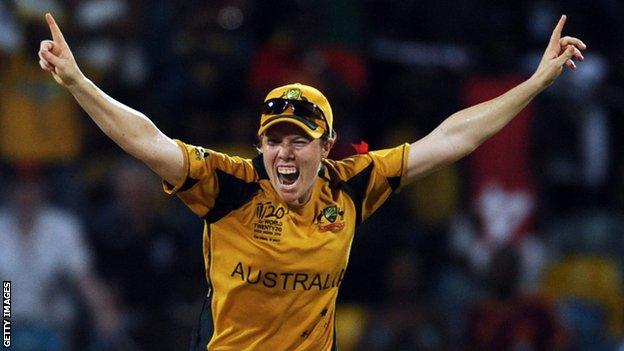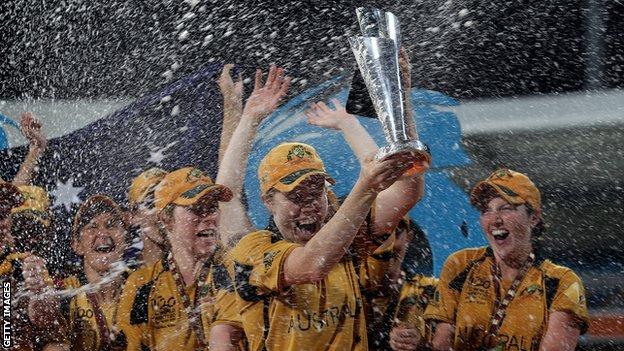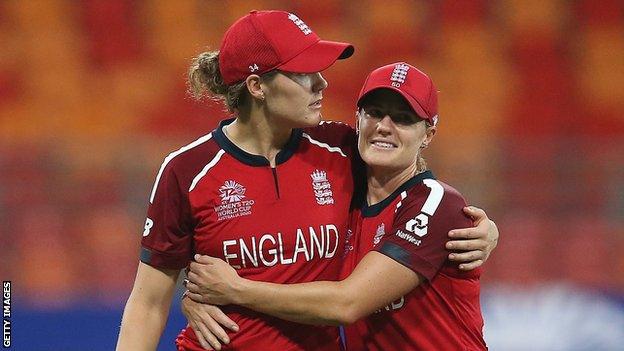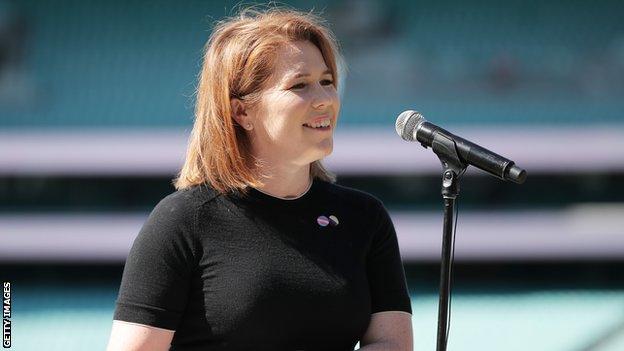Alex Blackwell on cricket, retirement and LGBTQ+ inclusion: 'I've had to examine my own privilege'
Last updated on .From the section Cricket

Alex Blackwell can still see it now.
It's 2010. The T20 World Cup final between New Zealand and Blackwell's Australia side has come down to the final ball. The White Ferns need five runs to win.
"That moment where Ellyse Perry bowled to Sophie Devine," Blackwell says, before tailing off with a smile.
"We found a way to win, and in that moment, I was screaming, I was yelling, I almost fainted because I was so excited!"
New Zealand batter Devine struck the ball sweet and straight as she sought the crucial runs - but Perry stuck out a foot to deflect the ball to safety, and seal the victory.
"It was just the most amazing moment," Blackwell remembers, "and to raise that trophy as Australia captain, on behalf of my team-mates but also my country - it doesn't get much better than that."
If no other game can top that for Blackwell, there are still plenty that come close.
The New South Wales-born cricketer achieved much in a career that spanned the best part of two decades, and was - at one point - Australia's most-capped female player.
Yet for all the champagne moments on the pitch, there was a less inclusive side of cricket that Blackwell was battling as well.

It was at promotional events for the Australian national side that Blackwell started to notice it.
"We'd go, and there'd be lots of sponsors and administrators," she remembers.
"And to be asked by randoms at events: 'Oh, how many of the girls are gay?' - and have a really inquisitive nature about your sexuality or the sexuality of people on your team - when you don't know who you are yourself?
"That had a big impact on me.
"My dad and mum really instilled in me that I'm no better and no worse than anyone else. So to experience homophobia, and to feel that you're not celebrated equally, and that the sport might prefer you weren't that way, was really troubling."
And so, in 2013, Blackwell decided to come out publicly as gay.
'I decided not to cave to subtle messages'

She was the first female international cricketer to speak openly about their sexuality, and just the second international to do so while an active player, after England's Steven Davies.
"I decided not to cave in to the subtle messages I was receiving that 'there's something not quite right with you'," Blackwell says.
"I guess [coming out] was in response to experiencing homophobia, and knowing that I felt we should all feel equal in sport and do something about it, because it's such a deterrent to so many people."
Sharing her story publicly wasn't a decision Blackwell took lightly.
"No other female cricketer had spoken openly, despite some of my heroes also being gay and not feeling they could be out," she says.
"And to be the first in women's cricket, that's not easy.
"I didn't mean to come out and be an advocate for inclusion and making sport a safe place for LGBT people. But that's how it turned out, after I decided to be my whole self in sport and in every aspect of my life.
"I've let others feel that they can do that too, and that's really special for me.
"To see the way that a Katherine Brunt or a Nat Sciver can be free and all of who they are... and it's 2022, we should be!"
'I've had to examine my own privileges'

Retirement from the game hasn't led to a quieter life for Blackwell.
There've been commentary gigs and newspaper columns, and she has become a mother alongside wife Lynsey - a former England international.
The Covid pandemic gave Blackwell the chance to write a memoir of her time in the game - something she describes as a crucial step in processing her career and her retirement - and she serves as one of the patrons for Pride in Sport, a not-for-profit organisation working to promote inclusion at all levels of sport in Australia.
"Homophobia and transphobia in sport is still unacceptably high, and that's not good enough," Blackwell says.
"I think that it's hard for men and women, or for non-binary and intersex people. It's hard in different ways - and hard is just hard, right?
"I've had to examine my own privileges. As a white, cis-gendered woman in Australia, I've had so many good things come my way, and as an advocate for LGBTQ+ inclusion in sport for over a decade, I've learned that I can stand up for other people as well as myself.
"But it's taken a long time for people to feel comfortable, so we have work to do to make sure our young people are active. And if young gay people don't feel safe or celebrated in sport, that's a big problem for all our countries.
"If we can get people active and healthy, both mentally and physically, it's good for everyone - and sport has a big part to play in that."
Alex Blackwell was speaking to Jack Murley on the BBC's LGBT Sport Podcast. You can hear new episodes every Wednesday on BBC Sounds.

- A funny, moving and revealing look at a marriage: Sean Bean and Nicola Walker star in a brand-new drama
- Transfer Gossip Daily: Get up to speed with the latest tantalising rumours


















